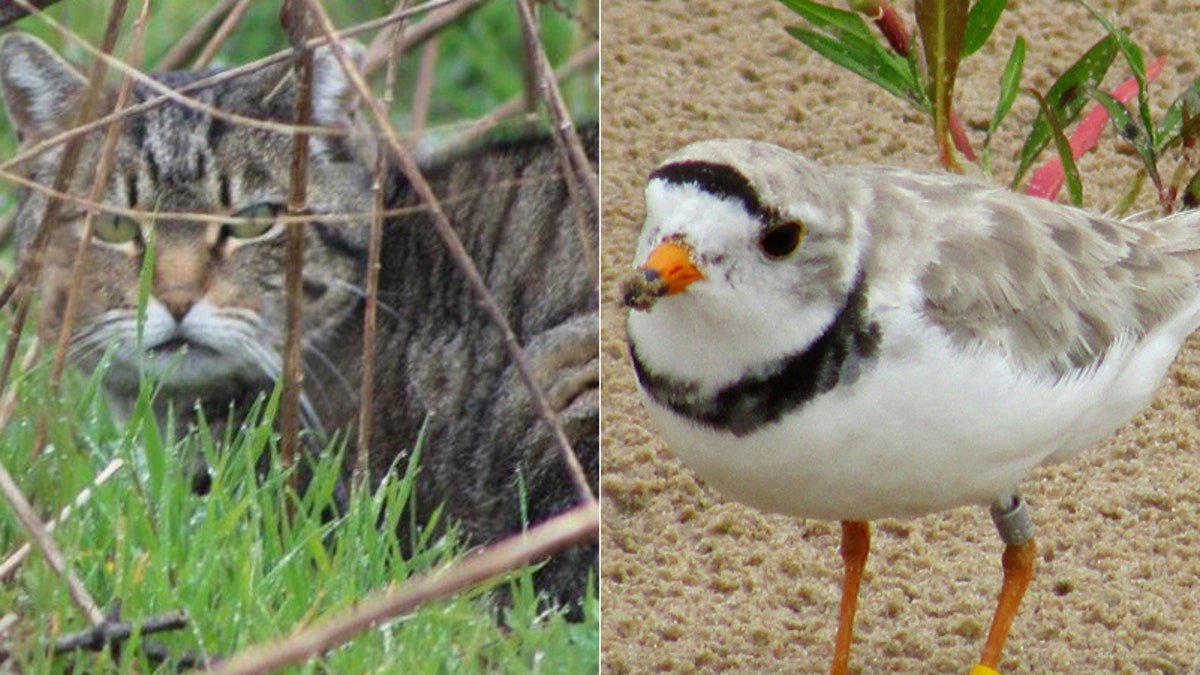
A battle is brewing on Long Island between feral cats and an endangered bird species. (AP)
WANTAGH, N.Y. – Forget Sylvester and Tweety: A real-life battle is brewing on Jones Beach over the natural tension between cats and birds.
An American Bird Conservancy lawsuit claims the state is failing to adequately protect an endangered bird species called the piping plover by allowing cat lovers to feed and care for a colony of feral felines on the barrier island where the birds nest. The federal suit wants a judge to order the cats removed.
Advocates on both sides of the debate say the creatures are defenseless and could not survive without human help.
"We just can't bring these cats somewhere else," said Stephanie Capuano, who lives near the beach and has been taking care of the cats for about 16 years in makeshift shelters made from pallets and plastic tarps. She said the cats, whose numbers have dwindled over the years from several dozen to about 15, would likely end up euthanized because they are too wild to be domesticated.
Grant Sizemore, the bird conservancy's director of invasive species programs, said the fact that the cats are well-fed and cared for does not reduce the hazard to the piping plover.
"Feeding feral cats, as happens at Jones Beach, does not eliminate their instinct to hunt," he said. "And in fact, the mere presence of cats has been shown to have significant adverse effects on breeding birds."
Piping plovers, small shorebirds with sand-colored plumage on their backs and crown, have been listed as threatened in the Atlantic Coast region for 30 years under the federal Endangered Species Act.
It is too early in the spring for plovers to be out on Long Island's coast, but on a visit to the beach last week, an Associated Press reporter found several cats in a wooded area off a beach parking lot. The felines dashed off when approached, but they looked to be in good health.
Capuano, among a small group of volunteers that has been taking care of the cats, said they participate in a national initiative that traps, neuters and returns the feral cats to the wild, in order to prevent further proliferation.
"It's disgraceful the bird people have sued the parks," said Capuano, who contends that the cat lair is quite a distance from the plover nesting areas and that the cats don't roam in that direction because they are fed regularly.
Piping plovers, though, have a famously fragile presence on Atlantic beaches. Anne Hecht, an endangered species biologist for the U.S. Fish and Wildlife Service, said an intensive protection effort has helped boost the numbers of the birds along the Atlantic Coast from 790 pairs in 1989 to a 1,850 pairs last year.
The wildlife service in 2009 identified feral cats as a specific threat to piping plovers. Hecht noted that the piping plover chicks are extremely vulnerable to predators because they don't have the feathers to fly. "And cats are hard-wired to hunt birds."
A spokesman for the parks department declined to comment, citing the pending litigation.
Becky Robinson, president and founder of Alley Cat Allies, a national advocacy organization dedicated to the protection and humane treatment of cats, argued that the cats at Jones Beach are not reproducing.
"What's happening at Jones Beach represents a proven approach to managing populations of cats that live outside," she said. "The lawsuit ignores habitat loss and degradation, which experts agree has severely affected piping plover populations and has occurred all along the Atlantic Coast and throughout the country."

